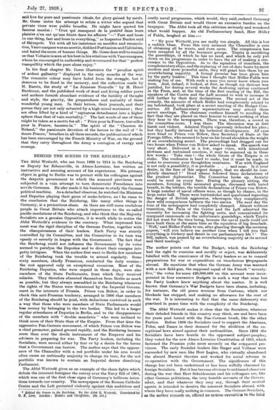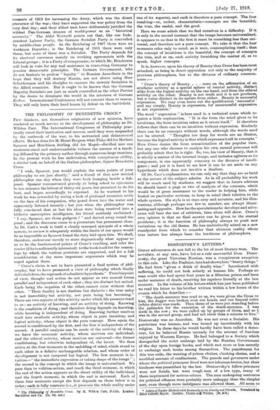BEHIND THE SCENES IN THE REICHSTAG.*
THE Abbe Wetterle, who sat from 1898 to 1914 in the Reichstag as Deputy for Ribeauville, in Alsace-Lorraine, has written an instructive and amusing account of his experiences. His primary object in going to Berlin was to protest with his colleagues against the despotic government to which the annexed provinces were subjected in a vain attempt to turn democratic Frenchmen into servile Germans. He also made it his business to study the German political machine. As a detached observer, he watched the Ministers and Deputies playing their game of make-believe, an I he came to the conclusion that the Reichstag, like many other things in Germany, is a pretentious sham. As there are still some credulous people in Great Britain who attach importance to the so-called pacific resolutions of the Reichstag, and who think that the Majority Socialists are a genuine Opposition, it is worth while to notice the Abbe Wetterle's evidence to the contrary. What impressed him most was the rigid discipline of the German Parties, together with the obsequiousness of their leaders. Each Party was strictly controlled by its Committee, and the Committee in its turn was openly or secretly in league with the Government. The fact that the Reichstag could not influence the Government by its votes seemed to paralyse the Deputies and to divert their energies into petty intrigues. When the author first went to Berlin few members of the Reichstag took the trouble to attend regularly. Some sixty members, chiefly Prussians, conducted the daily routine ; the rest appeared only on exceptional occasions. Most of the Reichstag Deputies, who were unpaid in those days, were also members of the State Parliaments, from which they received salaries. They therefore absented themselves from Berlin as much as possible, but they always assembled in the Reichstag whenever the rights of the States were threatened by the Imperial Govern- ment in the interests of Prussia. Prince von Billow, in order to check this anti-Prussian tendency, arranged in 1906 that members of the Reichstag should be paid, with deductions contrived in such a way that those who were members of State Parliaments would lose money by belonging to the two bodies. This led to a larger regular attendance of Deputies in Berlin, and to the disappearance of the members with "double mandates" who were inclined to think more of their State than of the Empire. From that time the aggressive Pan-German movement, of which Prince von Billow was a chief promoter, gained ground rapidly, and the Reichstag became more than ever the docile instrument of the Emperor and his advisers in preparing for war. The Party leaders, including the Socialists, Were moved either by fear or by a desire for the boons that a Government can bestow. The author says that the appear- ance of the Chancellor with a red portfolio under his arm would often cause an unfriendly majority to change its tone, for the red portfolio was known to contain an Imperial decree dissolving Parliament.
The Abbe Wetterle gives as an example of the sham fights which delude the innocent foreigner the outcry over the Navy Bill of 1901, which was one of the first clear signs of Germany's bellicose inten- tions towards our country. The newspapers of the Roman Catholic Centre and the Left protested violently against this ambitious and
• Behind the Scene* in the Reichstag. By the Abbe E. Wetterle. Translated by 0. F. Lees, Louden Redder and Stoughton. I0s. net.] costly naval programme, which would, they said, embroil Germany with Great Britain and would throw an excessive burden on the taxpayer. The Abbe took all this criticism seliously and wondered
what would happen. An old Parliamentary hand, Herr Miller of Fulda, laughed at him :—
" My poor Wetterle, you are really too simple. All this is but a sudden blaze. From this very moment the Chancellor is sure of obtaining all he wants, and even more. The compromise has been accepted by all the bourgeois groups. Tirpitz is sacrificing the guardships, of which he has no need, and which he only put down on his programme in order to have the air of making a con- cession to the Opposition. As to the squadron of ironclads, the complementary ships, and the replacing of out-of-date boats by more modern and more powerful units, they will grant him them by an overwhelming majority. A formal promise has been given him by the party leaders.' This time I thought that Milller-Fulda was making fun of me. With such a man you never knew where you were. And, indeed, it looked, at first, as though my distrust was justified, for during several weeks the deafening uproar continued in the Press, and, at the time of the first reeding of the Bill, the speakers of the Centre and the Left seemed to wish to increase it still further by their fiery declarations. The second act of the comedy, the scenario of which Muller had complacently related to me beforehand, took place at a secret meeting of the Budget Com- mittee. All Parliamentary representatives may attend these secret meetings. The chairman confines himself to recalling the fact that they are placed on their honour to reveal nothing of what they hear to the newspapers. There was, therefore, a crowd in the committee-room. I was there. The discussion was at first harsh and violent. Admiral Tirpitz vigorously defended his plan ; but they hardly listened to his technical developments. All eyes were fixed on Prince von Billow, then Secretary of State at the Foreign Office, who seemed to bear on his broad shoulders the weight of an overwhelming secret. The proceedings had dragged out for two hours when Prince von Billow asked to speak. His speech was very short. Delivered in a low, eager voice with intentional slowness and restrained emotion, it may be summed up in these few words : Take care I—the whole future of the Empire is at stake. The confession is hard to make, but it must be made, in order to overcome your thoughtless resistance. War with England is not only a possibility, it is probable . . . and near. Is it your desire, in the face of this urgent danger, that we should be corn- • pletely disarmed?' Dead silence followed these declarations of the prudent diplomatist. The Committee broke up. Anxiety could be read on every face. During the plenary sitting, the members, forming little animated groups, discussed with bated breath, in the lobbies, the terrible declarations of Prince von Billow. A large number of naval officers were, as though by chance, in the large outer hall. These were buttonholed and questioned regarding ' the danger of British aggression, whereupon they complacently drew wild comparisons between the two navies. The next day the tone of the newspapers had completely changed. Almost without transition, the Press of the Centre and the Left admitted the neeeseitr for increasing the fighting units, and concentrated its rearguard cannonade on the unfortunate vardahlr. which TirPitz did not want for the time being, because the naval yards could not have built them at the seine time as the squadron of big Ironclad& Well,' said Maller-Fulda to me, after glancing through the morning papers, will you believe me another time when I tell you that everything is trickery and deceit in our parliamentary life ? ' The Bill, indeed, was passed by an overwhelming majority at its second and third readings."
The author points out that the Budget, which the Reichstag '
had the right to examine and modify or reject, was deliberately falsified with the connivance of the Party leaders so as to conceal
preparations for war or expenditure on treacherous ptopaganda abroad. He mentions that when the German Army was rearmed with a new field-gun, the supposed equal of the French " seventy- five," the votes for some £20,000,000 on this account were incor- porated in four successive Budgets in such a way that none but the Party leaders knew anything about the matter. It is well known that Germany's War Budgets have been shams, including, for instance, the old peace revenue from Customs, which our blockade has stopped, and making no allowance for the cost of the war. It is interesting to find that the same dishonesty was practised in peace time with the complicity of the Reichstag.
The Abbe Wetterle makes it clear that the Socialists, whatever their deluded friends in this country may think, are and have been for years past tarred with the Pan-German brush, like the other Parties. Before 1906 the Socialists used to support the Alsatians, Poles, and Danes in their demand for the abolition of the ex- ceptional laws aimed against their nationalities. Since 1908 the Socialists have been hostile to the oppressed subject-peoples; they voted for the new Alsace-Lorraine Constitution of 1911, which fastened the Prussian yoke more securely on the conquered pro- vinces. The early Socialist leaders like Singer and Vollmer were succeeded by new men like Herr Legien, who virtually abandoned the absurd Marxist theories and worked for social reforms in co-operation with the Government. The significance of this
change has not been understood or has been wilfully obscured by foreign Socialists. But it has become obvious to unbiassed observers during the war that Herr Scheideinann and his colleagues are, like other German politicians, the very humble servants of the Govern- ment, and that whatever they may say, through their neutral
agents, is intended to deceive the innocent Socialists abroad, with whom they have really nothing in common. The German Socialists,
as the author reminds us, offered no serious oppeeiticn to the fatal measure of 1913 for increasing the Army, which was the direct Precursor of the war; they have supported the war policy from the very first day ; and their ablest men have deliberately justified the wildest Pan-German dreams of world-power as an "historical necessity." The Abb6 Wetterle points out that, like our Inde- pendent Labour Party, the German Socialist Party is controlled by middle-class people, in the Reichstag of 1907 there were no workmen Deputies ; in the Reichstag of 1911 there were only three, but none of these was a Socialist. The Party depends for its electoral successes mainly on working agreements with the Liberal groups ; it is a Party of compromise, to which MT. Henderson will look in vain for any real assistance in con.vtxting Germany to genuine democratic principles. The German Government, who do not hesitate to profess " loyalty " to Russian Anarchists in the hope that they will destroy Russia, are not above using Herr Scheidemann and his disciples to ensnare the unwary Socialists in the Allied countries. But it ought to be known that the German Majority Socialists are just as much controlled as the other Parties by the desire to dominate the world in the interests of German Kultur. International Conferences will not convert them to reason. They will only learn their hard lesson by defeat on the battlefield.



































 Previous page
Previous page